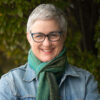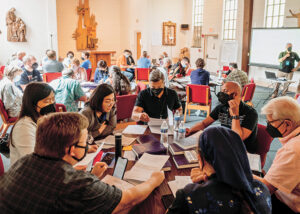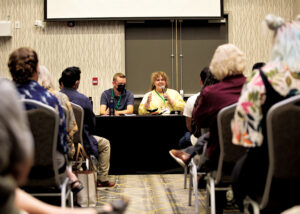“If I’m here, surely there are more of us, and one of us just needs to start it.”
With those words in mind, Rachel Reid decided to reach out to all the churches in Mennonite Church Eastern Canada (MCEC) in hopes of starting a young adult network. Her home church—Hamilton Mennonite in Hamilton—doesn’t have a lot of other young adults, and she found herself struggling to find a faith community that was affirming when she was a university student, so she decided to start a Bible study and reached out to see who else might be interested.
After connecting with young adults across the province, including some in areas where there is no Mennonite church, Reid proposed a Zoom Bible study. “[Online is] no one’s first choice for a small group, but it makes it possible for us to connect.” A stable group met on Sunday evenings throughout this past spring, disbanding for the summer while some worked at camps.

Reid says their group, Mennonite Young Adults, is aimed at “students and people in the mid-to late-20s chaos of moving and living in different places, who are maybe distant from our home churches.”
Reid says of Mennonite Young Adults, “The goal is to be peaceful and inclusive. I want everyone to feel safe. I love having people disagree—those are some of my favourite conversations—but there’s no room for those who make others unsafe. Conversations where people can talk about the Bible and faith, and be open to each others’ paths with a spirit of curiosity, are meaningful.”
This is important for the future of the church, says Jane Schultz-Janzen, who heads Christian education at Shantz Mennonite in Baden, Ontario, and who took a providential car trip with Reid last winter, during which they discovered their mutual passion for young adult ministry. Schultz-Janzen has a son interested in connecting with other Mennonite young adults for social events but also says her motivation comes from the widespread desire for connection and belonging. “I want people to see that the church is a larger space and to get reacquainted in their love and interest in the church.”
But there is also a need for the church to get reacquainted with young adults. Ann L. Schultz, interim executive team leader of MCEC, describes youth engagement as a “vital aspect of the church,” and points to MCEC’s recent “Youth Engagement in MCEC Churches” as part of MCEC’s collective efforts to “discern how best to support youth and young adult ministry, viewing our regional office as a resource and support hub through our leadership and mission offices.”
Reid says to churches, “Look back at the gospel and the roots of Mennonite history and see the young people and Jesus’ radical calls to action.” Reid adds, “You don’t need to hold pub nights to draw young people in—though you might have to go out and protest with us—but find activities that are intergenerationally appealing. It’s meaningful for young people to talk with older people because we are baby adults.”
Reid also notes that sometimes in the essential focus on developing community within the church, outreach gets forgotten. “There’s not a decline in faith among young people. They’re just not so sure about the church. People of all backgrounds are hungering for community, belonging and especially meaning, because there’s a lot that’s superficial and frustrating and angering in the world. There’s violence and impacts of colonialism and racism. People want justice and peace. They seek community because it’s necessary for creating a livable, decolonized future. The more I learned about this, the more I thought, that’s the church.”
To classmates who studied cultural studies at McMaster University and who voice such longings, Reid would say, “You should check out the Mennonites.” While these friends express uncertainty about institutional religion, they are interested in exploring Christian faith and the Mennonite church.

So far this is very much a volunteer-led, grassroots initiative. It is also not the only young adult initiative within MCEC.
Among others is Pastors in Exile (PiE), “a progressive and affirming community-based ministry that seeks to empower young adults as they explore and deepen the spiritual meaning of their lives, world, work and activism.” Based in Kitchener, Ontario, PiE also works with Silver Lake Mennonite Camp in offering a Winter Camp for Grown-Ups, aimed at those in their 20s and 30s. Steph Chandler-Burns, pastor at PiE, says, “Many who come to PiE also go to church. They come to PiE to find community with people in a similar place who can reflect together how to live out the faith they also care about on Sunday mornings rather than just thinking about it.” They add that Winter Camp for Grown-Ups is “a response to the highly anxious times in which we live, offering space to relax for a weekend with others who care deeply about faith and who need a place to care for themselves too.”
Mennonite Young Adults is also creating space for young adults through worship nights, social events and weekly Bible study discussions, but Reid says, “My dreams for it are growing.”
Reid’s excitement is contagious. She has connected with a similar initiative in British Columbia, attending their gathering, and says she would love to hold annual conferences in person. Increasingly, too, Reid says, “It has become clear that this is my calling. It’s been undeniable.”








Leave a Reply
You must be logged in to post a comment.